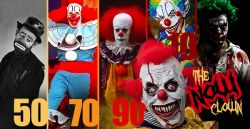
Frowns of the Modern Clown | Scary Clowns | Clown Marketing
admin | Monday October 17, 2016
It’s official. Clown hysteria is an international phenomenon and it’s making nice clowns unmarketable.
McDonald’s announced this month they are putting Ronald McDonald on the bench until creepy clown hysteria blows over… but they could be waiting a long time.
What began in South Carolina and rapidly spread throughout the United States has recently surfaced in Scotland, Australia and New Zealand… for starters.
Historians and social psychologists have long examined societies’ infatuations with jesters and their prevalence throughout human history dating back as far as ancient Egypt. There have been clowns, jesters, fools and priests serving different purposes in their respective times and places across the globe, archetypically interchanging between positive and negative association.
Today the popular portrayal and perception of the clown, at least in mainstream media, has become more violent than peaceful, making it difficult to market clowns as anything nice. In America this can be attributed to clown contributions from serial killer John Wayne Gacy, Stephen King’s Pennywise from It (1986), DC Comics’ Joker and even a group of loud obnoxious ass clowns known as the Insane Clown Posse.
If there was one enduring positive American clown it was Ronald McDonald, but even he has been heavily scrutinized since the 2004 film Super Size Me in which director Morgan Spurlock literally poisons himself with McDonald’s food.
There are no good clowns left in America, at least none of prevalence. Even at a community level clowns are pretty useless other than in haunted houses. A study conducted in 2008 concluded that very few children actually like clowns -- ironically for the same reason adults don’t -- fear of the unknown.
Clowns are unpredictable in their appearance and behavior. They perform with loud spontaneous props and the whole bit depends on keeping you in a state of shock. For the older observer, the state of shock shifts towards a bizarre obsession with who or what lurks beneath.
In the best scenario it’s a person whose life probably seems very odd. Being a clown is just one of those professions no one understands how you end up in. It’s like doing the lighting on a porn set, or working at a Hyundai dealership. It just doesn’t make any sense.
But all scathing of the profession aside, the question remains, how should people in the clown business respond to the fad? Well it depends on who you are.
If you are a performer at children’s birthday parties you should quit your job because research heavily suggests you are scaring the children. Dress up as something else instead, like a giant mouse or perhaps a bear in overalls who plays the banjo.
If you work in a haunted house like Jordan Jones, founder of Clown Lives Matter, that’s a different story. You’re doing what clowns are supposed to do which is scare the shit out of people and you can market that all you want. Clown Lives Matter, heavily chastised for riding the coattail of Black Lives Matter, is a proactive movement to prevent violent acts against performers. In light of recent clown hunts at college campuses, and a general consensus on the internet that citizens can and should retaliate against strange clown approaches, performers’ fears of preemptive assaults have grown.
Notable clown authorities like Stephen King and the Insane Clown Posse have publicly urged their fans to remain calm and not feed into the fire, but the fact is the threats are real to them as well.
The question of why this has happened and spread so quickly, well… morbid curiosity amidst an existing climate of uncertainty and fear in the world coupled with unprecedented speed in electronic communication. Millions of Google searches are conducted each day for “creepy clowns.” It’s happened, it’s spreading and it appeals to people all over the world who are either scared of clowns or are pathologically susceptible to dressing up like clowns in order to hurt, scare or annoy people or just to get attention. One thing remains consistent across all planes, and that is the negative association. People aren’t searching for “nice clowns” or “happy clowns”.
